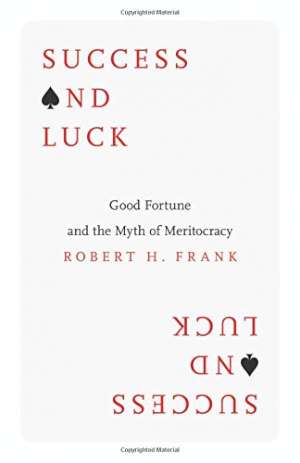28 June 2016
Success and Luck: Good Fortune and the Myth of Meritocracy
Robert H Frank
2016, Princeton University Press, 208 pages,
ISBN 9780691167404
Reviewer: Matthew Whittaker, Chief Economist, Resolution Foundation

What determines success in life? Given the title of his new book, it will not surprise you to hear that Cornell University’s Robert H. Frank ascribes at least part of the explanation to good fortune. He is at pains to assure us that achievements are not only a matter of providence, noting that successful people are invariably talented and hard working too. But, through example after example – some drawn from personal experience, some resting on intuitive modelling – he highlights the centrality of luck in explaining why the balance is tipped ultimately towards this person rather than that one.
Frank’s determination to land the argument stems from a belief that our collective failure to recognise the importance of luck results in waste, inequality and insufficient investment in the future. By shifting opinions, he hopes to create the opportunity to introduce significantly more progressive forms of taxation. As evidence, he highlights a number of persuasive and often entertaining experiments, which suggest that people who achieve a given ‘success’ are more disposed to generosity and altruism when explicitly reminded of the role luck has played in their outcome.
His specific suggestion is to replace existing income taxes with a much more progressive consumption tax. In practical terms, families would report their combined income and savings each year with the residual then being subject to tax. The first tranche of a household’s spending would be tax-free and the rate charged would then rise steeply in order to generate large returns from those spending the most money.
This approach raises a whole host of questions, which are insufficiently tackled. It is unclear how the transition to the new system would work, particularly given the current environment of subdued demand. And there is no discussion of the global impact of pushing the US towards a higher investment, lower consumption economic model. Perhaps most frustratingly, Frank fails to set out any illustration of the levels of tax that should apply to different ranges of spending. Nevertheless, the argument that acknowledgement of luck can transform attitudes to tax at least moves the debate beyond what appear to be – as set out in Kenneth Scheve and David Stasavage’s recent book Taxing the Rich for example – futile appeals to ‘fairness’.
But there is a problem here – at least from a British perspective. The notion that luck plays a key role in success just does not seem that surprising. Class history, more limited reverence for the rich and the persistence of the old-school network is likely to mean that Frank’s questioning of meritocracy is less controversial here than it is in the US, where the notion of the American Dream still holds.
That said, a broader acknowledgement of the importance of misfortune in outcomes could help shift the language and perception around those at the opposite end of the income distribution as a means of changing attitudes on benefits.
Even if spreading the message of luck does affect attitudes though, there is a further problem which Frank acknowledges but does not offer any solution to. In setting out the good – potentially evolutionary – reasons why humans might be resistant to the idea that luck matters, he argues that it might provoke damaging defeatism. What is the point in working hard when there are so many obstacles to real success that we can’t overcome without the assistance of luck? Indeed, excessive self-awareness might even be bad for us, with the ‘depressive realism’ hypothesis suggesting that self-assessments of talents and failings are much more accurate among people suffering from depression than they are among others.
Stepping back from the potential flaws in the argument however, the book itself is largely an engaging read. Yes, it falls into the usual trap of taking one good idea and serving up anecdote after anecdote by way of proving the point. But at least the anecdotes Frank chooses are good ones. And even if you don’t buy the solutions on offer, the reader is challenged to consider new approaches to redistribution in a much-changed 21st century economy.
But will it succeed in shifting hearts and minds in a way that generates significant new tax policies that fall increasingly on the rich? Good luck with that.
